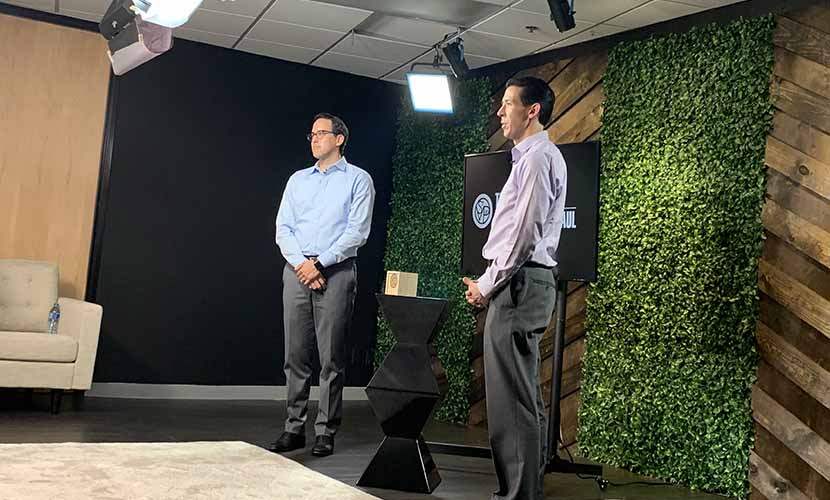
The Benefits of Virtual Events
A new world is emerging in the way we communicate with others. Technologies created or improved in the face of the pandemic helped us continue with business meetings, family gatherings and maintaining relationships, even though we kept our distances. Sometimes miles away. Although it seems like an inferior solution, virtual events have actually proven to be an effective alternative.
In fact, Grand View Research estimates the market size for virtual events is expected to grow by 23.2% from 2020 to 2027. This can be attributed to the many benefits these types of events provide to their guests. As lockdowns began, On Advertising had the foresight to transform our digital studio into a fully equipped virtual studio. We’ve been at the forefront of virtual meetings and conferences since the pandemic started, working with small groups to hundreds in attendance. As one of the top Arizona digital marketing agencies, we’ve highlighted a few benefits we’ve seen with these online events.
What is a Virtual Event?
Virtual events are an online space built to replicate a physical location-based event. It allows people and companies to host an online conference, trade show, product launch, job fair, lunch and learn session, or informative interviews from the comfort of their home or office. When deciding to host a virtual event, there are 5 types to consider:
- Webinar: These are the simplest form of online events and they’re a great starting off point for organizations in virtual planning
- Webinar +: This extends the concept of a regular webinar by adding features such as content hubs and in-depth reports
- Content and Connect: An essential aspect of in-person events is the opportunity to network with peers and experts. Event planners will be able to facilitate a way for people to connect with others virtually through their online events
- Online Summit/Conference: Much like in-person conferences, online summits are broken into themed sessions, offering short presentations, Q&As, and panels with full audience participation
- Virtual Expo/Fairs/Festivals: Like any in-person expo, organizers are trading their multi-day, multi-venue events for an online model built around a virtual replicate
How Can Businesses Benefit From Virtual Events
Online Events are Less Expensive
One prominent benefit to virtual events is their ability to save on overhead costs. Because you are saving on staff, venues, setup, takedown, meals, and travel costs, the overall cost of the event is greatly reduced. According to Aventri, it’s up to 75% less expensive than in-person events. The only cost planners must worry about is the costs associated with hosting an event on a virtual platform.
Promotes Attendee Growth and Delivers Additional Value
Because there aren’t any geographical limitations, people from all over the world can attend these virtual events. This allows for greater reach by inviting people who wouldn’t normally make it in-person to attend the online festivities. Furthermore, these online events will typically have overlapping sessions, allowing users to attend more than one panel simultaneously.
Virtual Events Can Easily Be Measured
One of the disadvantages of hosting an in-person event is the difficulty of measuring results. By hosting an online event, planners have the ability to easily access results thanks to being entirely online. They are capable of learning when attendees logged on, from where, the number of people who are attending, how they are paying, and so much more. With so much information, organizers have the data to evaluate the success of their event.
Do Virtual Events Work?
As mentioned, online events are growing and due to the COVID-19 pandemic, at a rapid speed. These types of events have become so popular amongst organizations, many industry leaders expect planners to begin developing hybrid models. Many people are beginning to look into hosting their own online events to make up for their inability to host in-person.
At ON Advertising, we’ve experienced firsthand just how effective this type of event can be. We recently helped the Seena Magowitz Foundation host their ‘2020 Celebration of Hope’ event, which replaced their annual gala and golf tournament. We also helped the non-profit, Saving Amy, with their ‘Toss Kindness Like Confetti’ event, which raised more than $120,000 in donations. Despite their inability to host in-person events, online alternatives provided them with a platform to safely reach and engage with users during the pandemic.
Plan Your Virtual Event With ON Advertising
In the midst of the COVID-19 pandemic, we knew we had to step up our event planning game. That is why we invested in Studio ON, our in-house production studio built with full filming, production, and live streaming in mind. Our event planning and production teams are equipped with the knowledge and equipment to ensure your virtual event goes off without a hitch. Contact us today to learn more about our event planning capabilities!







